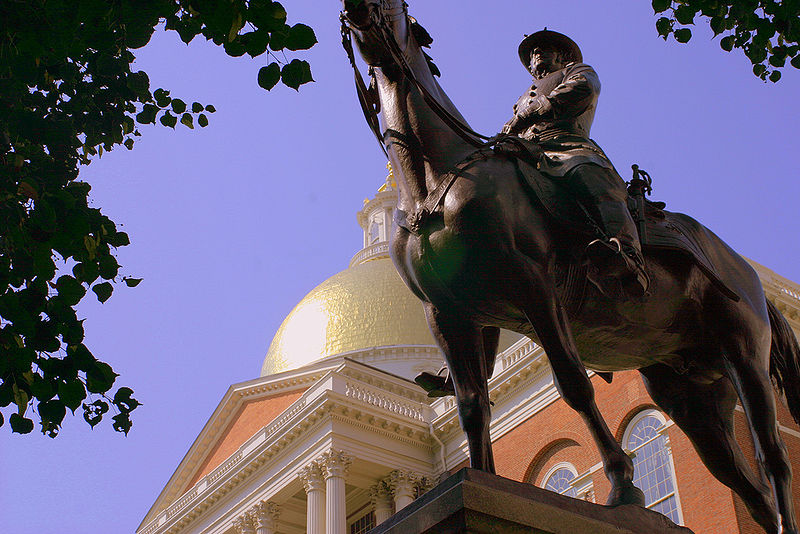By Lauren Frias
BU News Service
BOSTON – Supporters of civics education in Massachusetts public schools advocated for the Civics Project Trust Fund as part of the 2018 civic education law. Now comes the hard part – getting the money to pay for the effort.
The fund, which will cover material and professional training for teachers, will cost approximately $1.5 million, according to Sen. Harriette Chandler, D-Worcester, who promoted the original civics education bill that passed last November.
“That’s a very small number, considering that we’re talking about educating every student in every school across the state,” Ms. Chandler said. ”(The budget) is probably going to have room for what is a rather small fee for a learning process that we think is so important.”
The law requires Massachusetts public schools to include at least one student-led civics project as part of high school and eighth-grade curriculum and new efforts would be made to register teenagers to vote. Any student who chooses not to participate in a particular group project will have the opportunity to develop an individual civics project, with approval by the principal.
Massachusetts public schools will now be required to incorporate American and local history, social science and civics in their curriculum. This would include information on the United States flag, the U.S. Constitution and the Declaration of Independence, state and federal government, the electoral process, and the role of citizens in a democracy, along with media literacy training.
Rep. Alice Peisch, D-Wellesley, Chair of the Legislature’s Education Committee, wrote in an email that the purpose of the trust “is to provide a vehicle for funding the implementation of civics projects in 8th grade and [high school], and funding curriculum, partnerships with organizations, … as well as professional development.”
Specifically, Rep. Kimberly Ferguson, R-Holden, the ranking minority member of the education panel, said that “this fund would help provide funding for a certain activity for the school, a day trip somewhere for the students, or maybe a guest speaker to come in.”
While the lobbying event hosted by the Massachusetts Civic Learning Coalition last Tuesday was postponed due to inclement weather, some legislators are already hopping on board by co-signing a letter petitioning to fully fund the trust fund in the 2020 budget.
Ms. Ferguson said she will be a cosigner on the letter, noting that, while the state will be providing funding, “there’s still local control with the school districts so they can design programs for their students or design their own concepts regarding civics education.”
“We didn’t want to just require civics education without having some sort fund that would actually help jumpstart some of these initiatives,” Ms. Ferguson said.
Rep. Daniel Donahue, D-Worcester, said he was “proud to be a signatory” to support the fund, and is “always open to supporting increased access to education for our youth in our democracy,” according to his legislative aide Jon O’Brien.
With the trust backing the implementation of civics education in Massachusetts public schools, Ms. Peisch wrote that she hopes “more students will gain both a practical knowledge of how the various levels of government work, a genuine appreciation for the need to be engaged citizens, and realize that government can and should work for them to address their needs.”
Ms. Chandler echoed the sentiment, adding that better civic education could lead to increased civic engagement from youth.
“We’re hoping that, [as] a result of sort of a solid grounding in civics education, we’ll see more young people involved in the leadership of their state,” Ms. Chandler said. “We want our elections to show, instead of 14 to 15 percent voting records, I’d like to see at least 40 or 50 percent voting, or maybe even more than that, hopefully.”
While Ms. Ferguson said she believes there are involved young people who “understand the process and using their voice to speak up,” there are still “many other young people that just haven’t been able to receive the education specifically in civics.”
“I think everybody should be on a level playing field,” she said, “so when they leave school, they have a general understanding of how local government works, state government, federal government, and also how they can be involved from a young age in shaping their future.
“It’s critical that we hear from young people because they have a lot to say, and they are our future.”
Rep. Linda Dean Campbell, D-Methuen, a sponsor of the law, said the state’s current budget includes $1 million for Department of Elementary and Secondary Education to promote the implementation of the new standards and develop new high school assessments aligned with new curriculum standards in civics, history, and social science.
This story was previously published in the Worcester Telegram.





